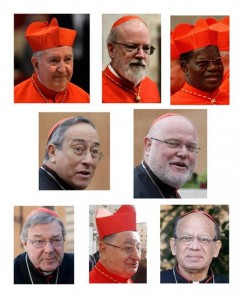Today, the Holy Father, Pope Francis formally instituted a group of cardinals he chose to forming what is now called the Council of Cardinals to assist him in the governance of the Church. One of the projects is to revise John Paul IIs Apostolic Constitution Pastor bonus (28 June 1988), which gives the operating procedures for the Roman Curia. The Council of Cardinals is an innovation in Church governance, and a good one, I think; its purpose is to give the Pope a wider and clearer perspective on what needs to be done by his Office, the Curia and the local bishop’s office. Today, more than ever, the Church needs a method consultation that is vigorous and truthful.
A cardinal is appointed from each of the continents, one from the Curia; there’s a bishop secretary and it’s expected that another Prelate from one of the Eastern Churches will be appointed. The meetings have begun.
 “Among the suggestions that emerged from the General Congregations of Cardinals prior to the Conclave, mention was made of the expediency of instituting a limited group of Members of the Episcopate, from various parts of the world, with whom the Holy Father could consult, individually or collectively, on specific matters. Once elected to the See of Rome, I have had the opportunity to reflect on this issue on a number of occasions, and consider that such an initiative would be of significant use in fulfilling the pastoral ministry of Peter’s Successor entrusted to me by my brother cardinals.
“Among the suggestions that emerged from the General Congregations of Cardinals prior to the Conclave, mention was made of the expediency of instituting a limited group of Members of the Episcopate, from various parts of the world, with whom the Holy Father could consult, individually or collectively, on specific matters. Once elected to the See of Rome, I have had the opportunity to reflect on this issue on a number of occasions, and consider that such an initiative would be of significant use in fulfilling the pastoral ministry of Peter’s Successor entrusted to me by my brother cardinals.
“For this reason, on 13 April I announced the constitution of the aforementioned group, at the same time indicating the names of those who had been called to participate. Now, following reflection, I consider it opportune that such a group, by means of the present Chirograph, be instituted as a ‘Council of Cardinals’, with the task of assisting me in the governance of the universal Church and drawing up a project for the revision of the Apostolic Constitution Pastor bonus on the Roman Curia. It will be composed of the same persons previously nominated, who may be called upon, both in Council and singly, on matters that I will from time to time consider worthy of attention. The aforementioned Council which, with regard to the number of members, I will compose in the most appropriate way, will constitute a further expression of Episcopal communion and of the aid to the munus petrinum that the Episcopate, disseminated throughout the world, may offer”.
Francis
28 September 2013, the first year of the Pontificate